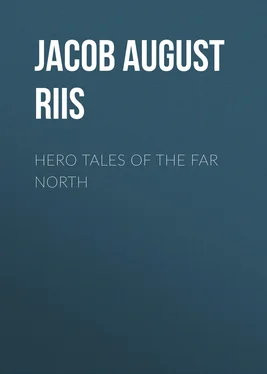Jacob August Riis - Hero Tales of the Far North
Здесь есть возможность читать онлайн «Jacob August Riis - Hero Tales of the Far North» — ознакомительный отрывок электронной книги совершенно бесплатно, а после прочтения отрывка купить полную версию. В некоторых случаях можно слушать аудио, скачать через торрент в формате fb2 и присутствует краткое содержание. Жанр: foreign_prose, История, foreign_edu, foreign_antique, на английском языке. Описание произведения, (предисловие) а так же отзывы посетителей доступны на портале библиотеки ЛибКат.
- Название:Hero Tales of the Far North
- Автор:
- Жанр:
- Год:неизвестен
- ISBN:нет данных
- Рейтинг книги:4 / 5. Голосов: 1
-
Избранное:Добавить в избранное
- Отзывы:
-
Ваша оценка:
- 80
- 1
- 2
- 3
- 4
- 5
Hero Tales of the Far North: краткое содержание, описание и аннотация
Предлагаем к чтению аннотацию, описание, краткое содержание или предисловие (зависит от того, что написал сам автор книги «Hero Tales of the Far North»). Если вы не нашли необходимую информацию о книге — напишите в комментариях, мы постараемся отыскать её.
Hero Tales of the Far North — читать онлайн ознакомительный отрывок
Ниже представлен текст книги, разбитый по страницам. Система сохранения места последней прочитанной страницы, позволяет с удобством читать онлайн бесплатно книгу «Hero Tales of the Far North», без необходимости каждый раз заново искать на чём Вы остановились. Поставьте закладку, и сможете в любой момент перейти на страницу, на которой закончили чтение.
Интервал:
Закладка:
Early in June they sighted land, but the way to it was barred by impassable ice. A whole month they sailed to and fro, trying vainly for a passage. At last they found an opening and slipped through, only to find themselves shut in, with towering icebergs closing around them. As they looked fearfully out over the rail, their convoy signalled that she had struck, and the captain of Haabet cried out that all was lost. In the tumult of terror that succeeded, Egede alone remained calm. Praying for succor where there seemed to be none, he remembered the One Hundred and Seventh Psalm: "He brought them out of darkness and the shadow of death, and brake their bands in sunder." And the morning dawned clear, the ice was moving and their prison widening. On July 3, Haabet cleared the last ice-reef, and the shore lay open before them.
The Eskimos came out in their kayaks, and the boldest climbed aboard the ship. In one boat sat an old man who refused the invitation. He paddled about the vessel, mumbling darkly in a strange tongue. He was an Angekok, one of the native medicine-men of whom presently Egede was to know much more. As he stood upon the deck and looked at these strangers for whose salvation he had risked all, his heart fell. They were not the stalwart Northmen he had looked for, and their jargon had no homelike sound. But a great wave of pity swept over him, and the prayer that rose to his lips was for strength to be their friend and their guide to the light.
Not at once did the way open for the coveted friendship with the Eskimos. While they thought the strangers came only to trade they were hospitable enough, but when they saw them build, clearly intent on staying, they made signs that they had better go. They pointed to the sun that sank lower toward the horizon every day, and shivered as if from extreme cold, and they showed their visitors the icebergs and the snow, making them understand that it would cover the house by and by. When it all availed nothing and the winter came on, they retired into their huts and cut the acquaintance of the white men. They were afraid that they had come to take revenge for the harm done their people in the olden time. There was nothing for it, then, but that Egede must go to them, and this he did.
They seized their spears when they saw him coming, but he made signs that he was their friend. When he had nothing else to give them, he let them cut the buttons from his coat. Throughout the fifteen years he spent in Greenland Egede never wore furs, as did the natives. The black robe he thought more seemly for a clergyman, to his great discomfort. He tells in his diary and in his letters that often when he returned from his winter travels it could stand alone when he took it off, being frozen stiff. After a while he got upon neighborly terms with the Eskimos; but, if anything, the discomfort was greater. They housed him at night in their huts, where the filth and the stench were unendurable. They showed their special regard by first licking off the piece of seal they put before him, and if he rejected it they were hurt. Their housekeeping, of which he got an inside view, was embarrassing in its simplicity. The dish-washing was done by the dogs licking the kettles clean. Often, after a night or two in a hut that held half a dozen families, he was compelled to change his clothes to the skin in an open boat or out on the snow. But the alternative was to sleep out in a cold that sometimes froze his pillow to the bed and the tea-cup to the table even in his own home. Above all, he must learn their language.
It proved a difficult task, for the Eskimo tongue was both very simple and very complex. In all the things pertaining to their daily life it was exceedingly complex. For instance, to catch one kind of fish was expressed by one word, to catch another kind in quite different terms. They had one word for catching a young seal, another for catching an old one. When it came to matters of moral and spiritual import, the language was poor to desperation. Egede's instruction began when he caught the word "kine"—what is it? And from that time on he learned every day; but the pronunciation was as varied as the workaday vocabulary, and it was an unending task.
It proceeded with many interruptions from the Angekoks, who tried more than once to bewitch him, but finally gave it up, convinced that he was a great medicine-man himself, and therefore invulnerable. But before that they tried to foment a regular mutiny, the colony being by that time well under way, and Egede had to arrest and punish the leaders. The natives naturally clung to them, and when Egede had mastered their language and tried to make clear that the Angekoks deceived them when they pretended to go to the other world for advice, they demurred. "Did you ever see them go?" he asked. "Well, have you seen this God of yours of whom you speak so much?" was their reply. When Egede spoke of spiritual gifts, they asked for good health and blubber: "Our Angekoks give us that." Hell-fire was much in theological evidence in those days, but among the Eskimos it was a failure as a deterrent. They listened to the account of it eagerly and liked the prospect. When at length they became convinced that Egede knew more than their Angekoks, they came to him with the request that he would abolish winter. Very likely they thought that one who had such knowledge of the hot place ought to have influence enough with the keeper of it to obtain this favor.
It was not an easy task, from any point of view, to which he had put his hands. As that first winter wore away there were gloomy days and nights, and they were not brightened when, with the return of the sun, no ship arrived from Denmark. The Dutch traders came, and opened their eyes wide when they found Egede and his household safe and even on friendly terms with the Eskimos. Pelesse—the natives called the missionary that, as the nearest they could come to the Danish präst (priest)—Pelesse was not there after blubber, they told the Dutchmen, but to teach them about heaven and of "Him up there," who had made them and wanted them home with Him again. So he had not worked altogether in vain. But the brief summer passed, and still no relief ship. The crew of Haabet clamored to go home, and Egede had at last to give a reluctant promise that if no ship came in two weeks, he would break up. His wife alone refused to take a hand in packing. The ship was coming, she insisted, and at the last moment it did come. A boat arriving after dark brought the first word of it. The people ashore heard voices speaking in Danish, and flew to Egede, who had gone to bed, with the news. The ship brought good cheer. The Government was well disposed. Trading and preaching were to go on together, as planned. Joyfully then they built a bigger and a better house, and called their colony Godthaab (Good Hope).
The work was now fairly under way. Of the energy and the hardships it entailed, even we in our day that have heard so much of Arctic exploration can have but a faint conception. Shut in on the coast of eternal ice and silence,—silence, save when in summer the Arctic rivers were alive, and crash after crash announced that the glaciers coming down from the inland mountains were "casting their calves," the great icebergs, upon the ocean,—the colonists counted the days from the one when that year's ship was lost to sight till the returning spring brought the next one, their only communication with their far-off home. In summer the days were sometimes burning hot, but the nights always bitterly cold. In winter, says Egede, hot water spilled on the table froze as it ran, and the meat they cooked was often frozen at the bone when set on the table. Summer and winter Egede was on his travels between Sundays, sometimes in the trader's boat, more often the only white man with one or two Eskimo companions, seeking out the people. When night surprised him with no native hut in sight, he pulled the boat on some desert shore and, commending his soul to God, slept under it. Once he and his son found an empty hut, and slept there in the darkness. Not until day came again did they know that they had made their bed on the frozen bodies of dead men who had once been the occupants of the house, and had died they never knew how. Peril was everywhere. Again and again his little craft was wrecked. Once the house blew down over their heads in one of the dreadful winter storms that ravage those high latitudes. Often he had to sit on the rail of his boat, and let his numbed feet hang into the sea to restore feeling in them. On land he sometimes waded waist-deep in snow, climbed mountains and slid down into valleys, having but the haziest notion of where he would land. At home his brave wife sat alone, praying for his safety and listening to every sound that might herald his return. Tremble and doubt they did, Egede owns, but they never flinched. Their work was before them, and neither thought of turning back.
Читать дальшеИнтервал:
Закладка:
Похожие книги на «Hero Tales of the Far North»
Представляем Вашему вниманию похожие книги на «Hero Tales of the Far North» списком для выбора. Мы отобрали схожую по названию и смыслу литературу в надежде предоставить читателям больше вариантов отыскать новые, интересные, ещё непрочитанные произведения.
Обсуждение, отзывы о книге «Hero Tales of the Far North» и просто собственные мнения читателей. Оставьте ваши комментарии, напишите, что Вы думаете о произведении, его смысле или главных героях. Укажите что конкретно понравилось, а что нет, и почему Вы так считаете.












